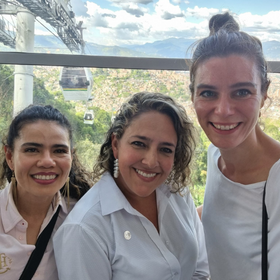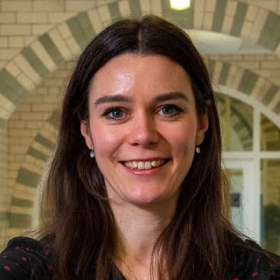It’s been nearly two years of remote working with our Colombian collaborators in Medellin until we finally were able to set foot into the country and understand the local complexities that affect older adults.
The pandemic has been good in some ways in that we can connect much better with peers in other countries, or regions within England itself. We can meet quickly and discuss things that pre-pandemic would have required travelling. From that point of view, meeting remotely has been great, including for our project.
Our ESRC-funded project [1] is looking at the impact of stressful life events on older adults in Colombia. By conducting interviews and surveys with older adults, health care professionals, and community leaders locally, we are co-developing a community-based mental health intervention for this population group. Specifically, the intervention is taking place in Turbo, which is even more deprived than some other regions in Colombia.
Whilst I have done research with other low- and middle-income countries, or LMICs, in the past few years, looking at older people, carers, and dementia, I have not yet been able to understand the localised context fully. That is apart from reading lots of news and scientific articles and learning from the different collaborators.

left – Dr Erika Montoya, centre – Prof Maria Isabel Zuluaga, Right – Dr Clarissa Giebel
In the past six months for example, I’ve been reading through English-translated transcripts of the stressful life events older adults in Turbo (Colombia) have witnessed and experienced. These include gender violence, kidnappings, armed violence, and extreme poverty, to mention a few. Completely different in most regards to what we are experiencing in England. Whilst most of these extreme life events have happened in the past, seeing the country and learning about its Governmental and health infrastructure in person really helped to contextualise what I read in the transcripts. The transcripts were shocking in themselves, all the more reason for me to try and understand what is happening on the ground.
Needless to say, Colombia is not as depicted in the Netflix series Narcos (any more). It was really interesting to see how people are going about their daily lives in the bigger cities Bogota and Medellin, but also in a completely different climate in Cartagena. What particularly struck me from the interviews, then seeing it in real life, was the many men, in particular older men, who were trying to sell goods to parked cars at traffic lights. Taxi drivers told us to lock our back doors just in case. However, I have not witnessed any acts of violence at all. Every single Colombian we’ve met either for work or on the road or in shops was incredibly friendly and appreciating our broken attempts at Spanish.

Dr Clarissa Giebel with collaborators in Colombia
That may be because we were so obviously not local. The only thing that did make me feel a little apprehensive was what we saw on our cable car journey over notorious Comuna 13. Our team was overlooking many comunas, including no. 13, which are stacked up one-room ‘houses’ in the mountains of Medellin and characterised by extreme poverty. That was in stark contrast to the hundreds of high rises you see in the city. Apparently, when gun shots are fired in any of the Comunas, the cable cars are stopped… Violence, and certainly extreme poverty, are still clearly present in a country that has been through armed conflict and drug violence.
So despite remote international collaborations being fantastic for working across borders, there is a huge benefit to seeing the local context on the ground. This is something that no data, no news piece, no article can truly portray. It helped me a great deal since to understand our qualitative findings better.
Would I go back? Absolutely! In fact, we are going back two more times as part of our project, seeing the intervention shaping up and hopefully helping many poorer older adults to get support for their mental health and well-being.

Dr Clarissa Giebel
Author
Dr Clarissa Giebel [2] is a Senior Research Fellow at the University of Liverpool and NIHR ARC North West Coast. Clarissa has been working in dementia care research for over 10 years focusing her research on helping people with dementia to live at home independently and well for longer, addressing inequalities that people with dementia and carers can face. Outside of her day work, Clarissa has also organised a local dementia network – the Liverpool Dementia & Ageing Research Forum, and has recently started her own podcast called the Ageing Scientist [3].